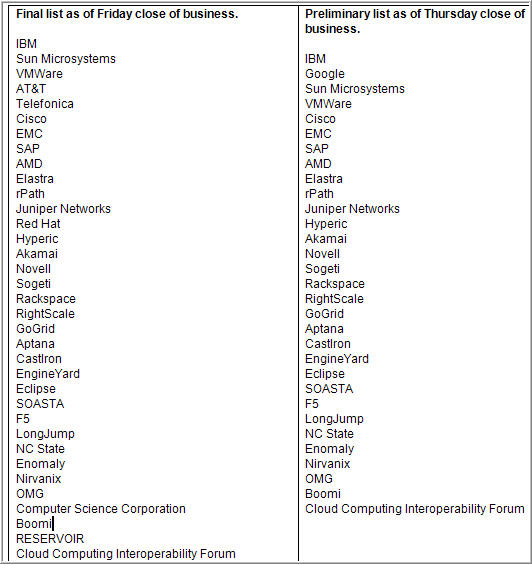Can you have an Open Cloud Manifesto without Amazon, Google, Salesforce and Microsoft?

IBM and other players on Monday will launch its Open Cloud Manifesto, a call to make cloud computing "open as all other IT technologies." But the list of companies that didn't sign on to the manifesto is telling. Amazon, Microsoft and Salesforce never signed on. Google was on a preliminary list of companies that signed on with the manifesto, but dropped off the final list.
Microsoft made its intentions known in a blog post last week and was an obvious no-show. But Amazon, Salesforce, Oracle and 3Tera---among a host of others---also failed to sign off on the manifesto (posted by Thinking Out Loud Friday) or weren't contacted. Meanwhile, Google dropped from the manifesto sign-on list at the last minute (perhaps after seeing that Amazon and Microsoft bailed). After some jockeying Friday--AT&T, Computer Sciences and Red Hat were late additions--here's the final list of companies that have blessed the manifesto compared with the preliminary list obtained Thursday:
After perusing that list a few glaring omissions become evident. For starters, any company that's currently working on a cloud operating system is a no show. No Salesforce. No Microsoft. No Amazon. No Google. And no Oracle or HP.
Dion Hinchcliffe: Cloud computing and the return of the platform wars
Here's Salesforce.com's statement:
"We support the goals of cloud interoperability and look forward to working with the signatories as well as continuing to work with partners like Google, Amazon, and Facebook. We believe that cloud platforms are and should always be more open than their legacy client-server antecedents, because that's what is best for customers and the entire cloud ecosystem."
Here's what an Amazon spokeswoman had to say:
We just recently heard about the manifesto document. Like other ideas on standards and practices, we'll review this one, too. Ideas on openness and standards have been talked about for years in web services. And, we do believe standards will continue to evolve in the cloud computing space. But, what we've heard from customers thus far, customers who are really committed to using the cloud, is that the best way to illustrate openness and customer flexibility is by what you actually provide and deliver for them. Over the past 3 years, we’ve made AWS available via multiple platforms, multiple programming languages and multiple operating systems – because that’s what customers have told us matters the most to them. We’ll continue to pursue an approach of providing customers with maximum flexibility as the standards discussion unfolds. In any event, we do believe that standards will continue to evolve and that establishing the right ones, based on a better understanding of what is needed, will best serve customers.
A few thoughts: It's far too early for manifestos. The manifesto is pretty vague and could fall into the hot air category depending on who is doing the reading. And there seems to be little room for companies that happen to make money using proprietary code. Meanwhile, we have no idea what standards will work best or should be adopted in the cloud at this juncture. And given that the standards process is extremely political any company that has invested in building cloud infrastructure would be silly to box itself into a manifesto.
Simply put, there's an API war on the horizon. This excerpt of the document tells the tale:
Without standards, the ability to bring systems back in-house will be limited by proprietary APIs. Once an organization builds or ports a system to use a cloud vendor’s offerings, bringing that system back in-house will require the organization to replicate the cloud vendor’s environment or change the system to use their own environment.
The principles and document overall are cast in an open source light: If you have APIs that are proprietary---or may be---this document could look pretty rigid. Meanwhile, the manifesto seems to indicate that companies should refrain from new standards. On page 5 of the manifesto, which could have started with "Dear Microsoft," you'll find the principles of note:
As the cloud computing community matures, there are several key principles that must be followed to ensure the cloud is open and accessible:
1. Cloud vendors must work together to ensure that the challenges to cloud adoption (security, integration, portability, interoperability, governance/management, metering/monitoring) are addressed through open standards.
2. Cloud vendors must not use their market position to lock customers into their particular platforms.
3. Cloud vendors must use and adopt existing standards wherever appropriate. The IT industry has invested heavily in existing standards and standards organizations; there is no need to duplicate or reinvent them.
4. When new standards (or adjustments to existing standards) are needed, we must be judicious and pragmatic and avoid creating too many standards. We must ensure that standards promote innovation and do not inhibit it.
5. Any community effort around the open cloud should be driven by customer needs, not merely the technical needs of cloud vendors, and should be tested or verified against real customer requirements.
6. Cloud computing standards organizations, advocacy groups, communities and open source projects should work together and stay coordinated, making sure that efforts do not conflict or overlap.
All of that sounds fine on the surface and customers should be able to cloud hop. But what if you have proprietary APIs like Microsoft's Azure effort. How about Force.com? Couldn't Force.com and Azure become standards? Does it matter if the software is proprietary as long as customers can easily move to another provider? For these companies it is far too early to sign off on a manifesto when the cloud is still in its infancy.
If roles were reversed and IBM had a fledgling cloud OS---say based on Tivoli---would Big Blue have signed off on its own manifesto this early in the game?
